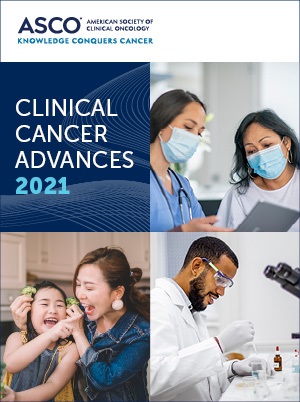ASCO’s Clinical Cancer Advances 2021 Report
ASCO’s Clinical Cancer Advances annual report highlights current trends in the field and identifies cancer research priorities that have great potential to advance progress against cancer. The 16th edition of the annual report was developed by a 26-member editorial board of experts. The editors reviewed scientific literature published in peer-reviewed journals or presented at major medical conferences, primarily from October 2019 to September 2020, selected advances that improve meaningful patient outcomes and have a strong scientific impact, and proposed priority areas of research that address vital unmet needs in cancer care and have the potential to improve the knowledge base for clinical decision making. This year’s report also discusses the critical issue of health equity in cancer research and solutions to ensure that every patient with cancer, everywhere, can access the latest advances.

The molecular profiling that drives progress in gastrointestinal (GI) cancers was selected as the Advance of the Year. Molecular profiling has helped change the outlook for patients with GI cancer by identifying the molecular and genetic signatures that allow oncologists to deliver treatments that are highly specific to a tumor.
The ability to molecularly profile a GI tumor has expanded the treatment options for individual patients with GI cancers – extending survival, while minimizing adverse effects. Specific genetic mutations, amplifications or fusions, epigenetic profile, protein expression, or other molecular features allow oncologists to choose targeted therapies matched to the molecular profile of their patients’ tumor.
In the past year, research has shown that targeting human epidermal growth factor receptor 2 (HER2) improves survival in gastric cancer and shows promise for patients with HER2-positive colorectal cancer.
Therapy is now approved by FDA that targets specific DNA mutations in metastatic colorectal cancer. The first-line treatment with pembrolizumab (PD-1 immune checkpoint inhibitor) doubles time to disease progression in patients with advanced colorectal cancer with DNA mismatch repair deficiency.
These advances are moving the treatment of GI cancers closer to personalized medicine.
Additional Major Advances
Advances featured in this year’s report reflect progress in a range of cancers and across prevention and treatment, including:
- Progress in bringing targeted therapies to patients with earlier-stage disease.
- Biomarker-driven treatment approaches that offer more personalized care for lung, colorectal, and gastric cancers.
- Combinations of different therapies that extend survival without increasing toxicity.
- A growing number of targeted therapies are offering extended survival for more patients with difficult-to-treat cancers.
Prevention
Accumulated data from observational studies and registries suggest a protective benefit associated with aspirin in patients with Lynch syndrome (hereditary cancer predisposition). Twenty-year follow-up, which included 427 individuals randomly assigned to receive daily aspirin or placebo for 2 years, showed a significant, meaningful decrease of 44% in colorectal cancers among Lynch syndrome carriers who took aspirin compared with those who took a placebo. This benefit took more than 5 years to become detectable but persisted beyond 20 years. Serious adverse events were comparable for the two groups. The optimal dosage and treatment duration remain to be determined.
ASCO Research Priorities to Accelerate Progress Against Cancer
Research priorities for 2021 represent promising areas of research that have the potential to significantly improve the knowledge base for clinical decision making and address vital unmet needs in cancer care. This year’s list includes a newly added priority on artificial intelligence, recognizing its growing potential to solve complex problems and drive diagnostic, therapeutic, and translational research across the spectrum of cancer prevention and care.
Develop and Integrate Artificial Intelligence (AI) and Deep Learning in Cancer Research
Primary focus areas include:
- Develop deep learning methodologies that aid in cancer diagnosis based on biospecimen analysis, including the detection of molecular variants that may affect prognosis or treatment decisions.
- Investigate the utility of AI to enhance and improve radiographic imaging, analysis, and reporting.
- Implement and assess AI systems that integrate large amounts of clinical data to aid clinical decision making and measurement of clinical outcomes.
Identify Strategies That Predict Response and Resistance to Immunotherapies
Priority focus areas include:
- Identify blood- and tissue-based biomarkers relevant to immunotherapies that can predict initial response, long-term disease control, adverse events, and resistance.
- Develop predictive models and algorithms that assign risk of severe immune-related toxicities based on readily available patient data.
Optimize Multimodality Treatment for Solid Tumors
Priority focus areas include:
- Develop analytically and clinically valid biomarker tests with proven clinical utility to identify recurrence risk after treatment of the primary tumor and determine the best options for patients with different degrees of risk.
- Define the patient populations that benefit from perioperative, neoadjuvant, and adjuvant therapies, including clinical, pathologic, genomic, biochemical, immunologic, and environmental or social factors that affect the likelihood of benefit.
- Study treatment de-escalation strategies that maximize benefit while reducing risk.
Increase Precision Medicine Research and Treatment Approaches in Pediatric and Other Rare Cancers
Priority focus areas include:
- Identify genomic and other molecular alterations in pediatric and rare cancers that can serve as potentially actionable treatment targets.
- Develop effective therapeutic agents that can target genomic or other molecular alterations in childhood and rare cancers.
- Explore the efficacy of existing targeted therapies in pediatric patients and patients with rare cancers that have mutations shown to be responsive to medicines that work in adult populations.
Optimize Care for Older Adults With Cancer
Priority focus areas include:
- Develop standardized methods to characterize physiologic aging, such as geriatric assessment, biomarkers of aging, and clinical pharmacology in older adults, to more reliably predict risk of treatment-related adverse effects in older patients with cancer.
- Use practice-based data to better understand the efficacy and toxicities of cancer treatments, including the impact on physical function, cognition, and quality of life, particularly among older adults most underrepresented in clinical trials, such as those with impaired functional status, comorbidities, or frailty.
- Test the role of geriatric assessment-guided management in improving outcomes using personalized care; important focus areas include strategies that minimize undertreatment of fit patients and overtreatment of vulnerable or frail patients, supportive care interventions, and care delivery interventions.
Increase Equitable Access to Cancer Clinical Trials
Priority focus areas include:
- Improve understanding of the barriers to trial enrollment among various under-represented groups, taking into consideration patient, practice, community, and trial-specific factors.
- Develop and test interventions that enhance clinical trial enrollment among under-represented population (examples may include use of educational tools, telehealth, and community-based involvement and participatory research).
- Evaluate novel strategies to improve access to clinical research resources in areas with large proportions of under-represented minorities.
- Develop mechanisms that improve awareness and education about clinical trials among underrepresented groups and the physicians treating them.
- Make use of clinical practice data to study differences in cancer incidence, prevalence, natural history of disease, and treatment experience, including efficacy and toxicity, among underrepresented populations.
Reduce Adverse Consequences of Cancer Treatment
Priority focus areas include:
- Develop and test strategies to mitigate and manage chronic toxicities associated with cancer treatment, including optimization of drug and radiation dosing.
- Identify genetic variants associated with increased risk of treatment-related toxicities.
- Deepen understanding of the underlying mechanisms of toxicities from targeted treatments, determine their contribution to long-term effects, and develop novel strategies to mitigate or eliminate such toxicities.
- Expand understanding and use of the range of pain management options for patients with cancer.
- Develop new tools to facilitate long-term tracking of patient outcomes that include patient-reported measures.
Reduce Obesity’s Impact on Cancer Incidence and Outcomes
Priority focus areas include:
- Improve the understanding of the mechanisms by which weight and energy balance, including physical activity and dietary factors, contribute to cancer development and progression.
- Investigate how obesity affects response to therapy, risk of cancer recurrence, and long-term cancer outcomes.
- Assess the impact of energy balance interventions, such as weight loss, increased physical activity, and improved dietary quality, on cancer risk, recurrence, and mortality.
- Identify effective interventions that optimize energy balance in people at risk and who are living with cancer.
Better Identify Potentially Malignant Lesions and Predict When Treatment is Needed
Priority focus areas include:
- Address barriers to screening and early treatment of potentially malignant disease.
- Identify potentially malignant lesions with a high risk for progression based on specific features and develop appropriate treatment strategies, while also identifying potentially malignant lesions that do not require intervention.
- Identify specific molecular pathways that drive progression of preinvasive lesions to invasive cancer and develop interventions that can delay or prevent progression to malignancy.
- Identify features of the microenvironment of potentially malignant lesions that are associated with progression to invasive disease.
- Investigate novel methods for evaluation of potentially malignant lesions to better inform the risk or likelihood of progression to invasive disease.
Source: https://www.asco.org/research-guidelines/reports-studies/clinical-cancer-advances-2021
